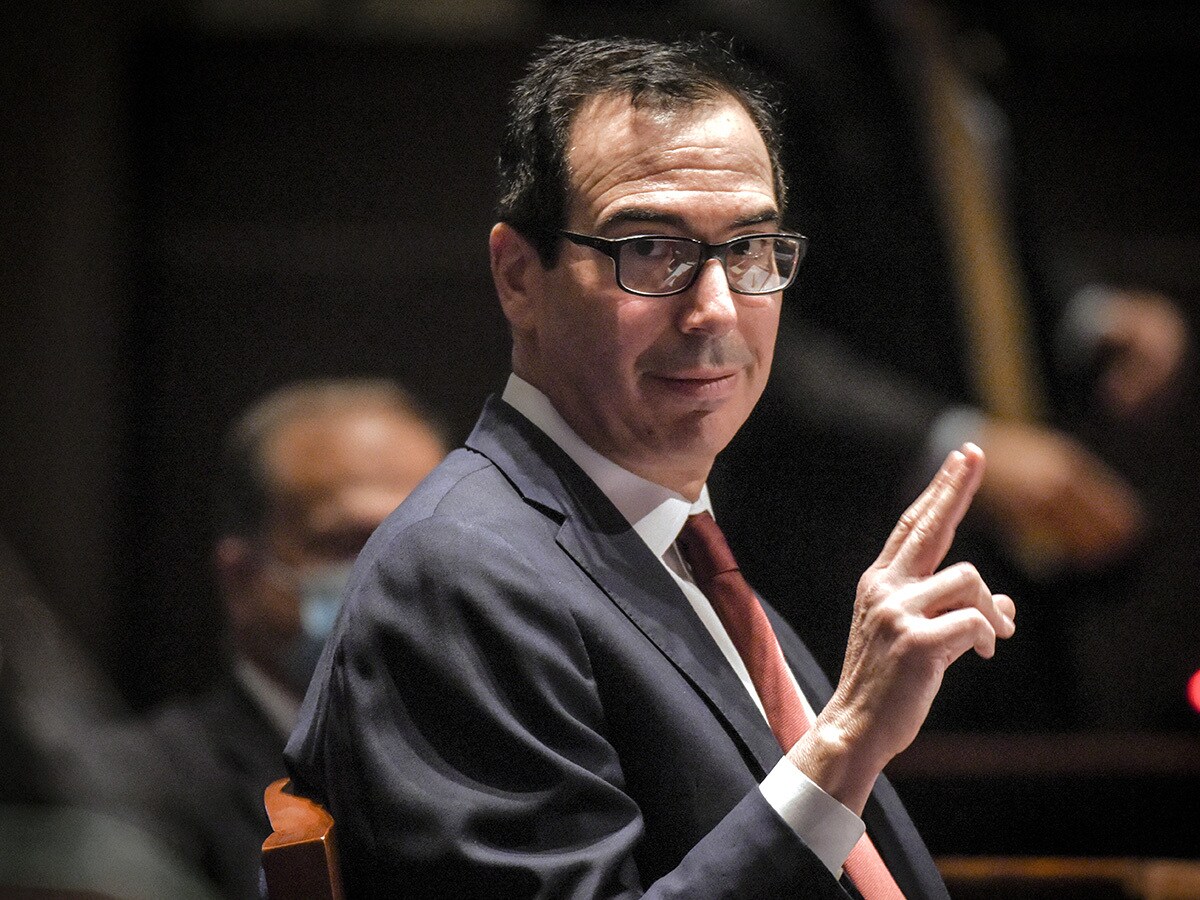The SoftBank [9984.T] share price popped on 21 September after the conglomerate agreed to back high-profile investment banker and former Treasury secretary Steve Mnuchin’s (pictured) new $2.5bn private equity fund.
Liberty Strategic Capital was launched earlier this year by Mnuchin, who managed all things fiscal during the Donald Trump Administration. A former Goldman Sachs senior executive and the founder of hedge fund Dune Capital Management, Mnuchin has investment pedigree. Under his oversight, Liberty Strategic Capital will focus on the technology, fintech, cybersecurity and financial services sectors.
Some of these themes overlap. And clearly, investors have given it their backing, with SoftBank’s share price jumping on the news. As a potentially undervalued stock, SoftBank’s share price could finally be on its way up.
What’s happening with SoftBank’s share price?
September has been a strong month for SoftBank’s share price. Between 1 and 8 September, SoftBank’s share price jumped more than 18%, going from ¥6,286 to ¥7,575. The stock then entered something of a tailspin before news of the investment in Liberty helped the stock bounce back.
This contrasts with SoftBank’s share price performance so far this year, having fallen 16.6% since the start of the year (through 29 September). Dampening sentiment has been second-quarter earnings that were noticeably softer than the record-breaking first quarter.
Hitting the bottom line in the results was the conglomerate’s exposure to Chinese tech stocks, which have suffered from Beijing’s regulatory scrutiny of the sector. There also appears to be some trepidation over SoftBank’s talismanic CEO Masayoshi Son’s strategy pivoting his investment strategy to back AI stocks.
Where does Liberty fit in with SoftBank’s wider strategy?
Many of the areas Liberty is looking at overlap with what SoftBank might consider its bread and butter, such as technology and fintech. According to the Financial Times, a person close to the decision said SoftBank had been encouraged to invest by Saudi Arabia’s Public Investment Fund [PIF], which has already put money into Mnuchin’s fund along with Abu Dhabi’s Mubadala. The fund was the biggest backer of SoftBank’s first Vision Fund and Yasir al-Rumayyan, who is the governor of Arabia’s Public Investment Fund, has a seat on the SoftBank board.
Liberty Strategic Capital's first investment has been Israeli cyber security start-up, Cybereason, with Mnuchin saying that he was influenced by cyberattacks during his time as Treasury secretary.
SoftBank’s Vision Fund 2 has also invested in the cybersecurity firm. Yet, despite the success of SoftBank’s first Vision Fund, the investment bank’s second Vision Fund has been struggling to get external backing. This has led to the investment bank investing its own money in the fund. Senior management have also taken a sizable stake in the fund.
In marked contrast to Vision Fund 1’s investment in internet stocks, the second iteration of the fund invests in emergent themes, such as artificial intelligence (AI).
AI and deep learning, as an investment theme, has grown 2.3% in the past month, according to Opto’s thematic screener, underpinned by strong performances of funds like the Global X Robotics & Artificial Intelligence Thematic ETF [BOTZ] and Fidelity MSCI Information Technology Index ETF [FTEC].
“AI is going to disrupt education, fintech, transportation, and medicine. I’m taking risks for that,” Son told Barron’s in an August interview.
“AI is going to disrupt education, fintech, transportation, and medicine. I’m taking risks for that” - SoftBank CEO Masayoshi Son
Where next?
SoftBank’s share price is arguably a bargain. The stock carries a forward price to earnings ratio of 9.44, its fundamentals look strong, and it is a profitable company. Among the analysts tracking SoftBank’s share price, the investment bank has a ¥10,547.20 average price target, hitting this would see a 55% upside on the 28 September close.
“The discount is too much. Investors still don’t trust our ability to continuously make good upside. We [must] prove ourselves in the next few years. People talk about us as if we are an index fund. If you are an index, you don’t trade at [a] discount. Someday, I believe we will trade at a premium,” Son told Barron’s.
Disclaimer Past performance is not a reliable indicator of future results.
CMC Markets is an execution-only service provider. The material (whether or not it states any opinions) is for general information purposes only, and does not take into account your personal circumstances or objectives. Nothing in this material is (or should be considered to be) financial, investment or other advice on which reliance should be placed. No opinion given in the material constitutes a recommendation by CMC Markets or the author that any particular investment, security, transaction or investment strategy is suitable for any specific person.
The material has not been prepared in accordance with legal requirements designed to promote the independence of investment research. Although we are not specifically prevented from dealing before providing this material, we do not seek to take advantage of the material prior to its dissemination.
CMC Markets does not endorse or offer opinion on the trading strategies used by the author. Their trading strategies do not guarantee any return and CMC Markets shall not be held responsible for any loss that you may incur, either directly or indirectly, arising from any investment based on any information contained herein.
*Tax treatment depends on individual circumstances and can change or may differ in a jurisdiction other than the UK.
Continue reading for FREE
- Includes free newsletter updates, unsubscribe anytime. Privacy policy





